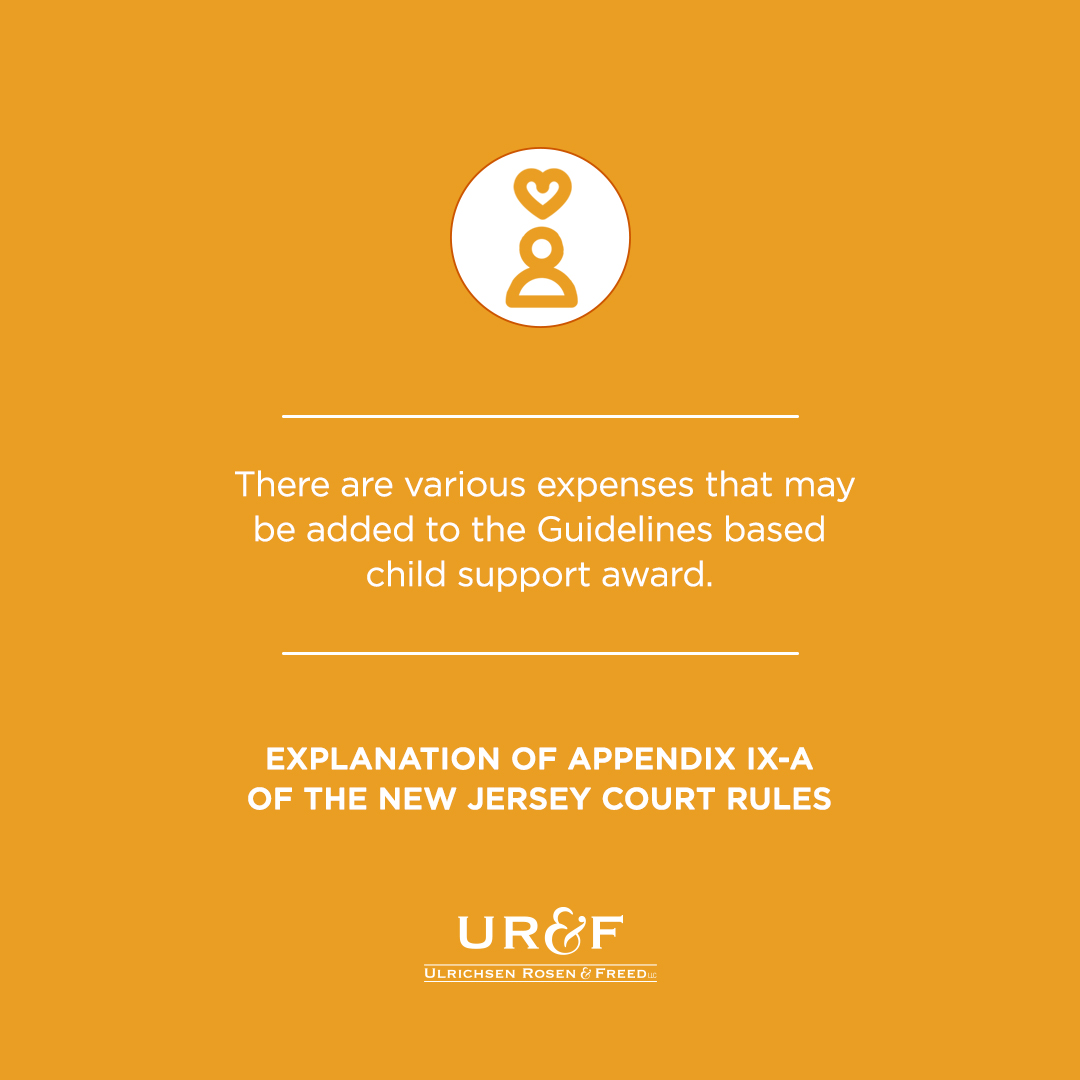Explanation of Appendix IX-A of the New Jersey Court Rules
Appendix IX-A of the New Jersey Court Rules, entitled as “Considerations in the Use of Child Support Guidelines” addresses the various factors that should be taken into consideration by the Court when establishing or modifying a parent’s child support obligation. The premise behind the Child Support Guidelines is that (1) child support is a continuous duty of both parents, (2) children are entitled to share in the current income of both parents, and (3) children should not be the economic victims of divorce or out-of-wedlock birth. The Guidelines attempt to simulate what parents would have spent on their children if the family had remained intact.
Pursuant to R. 5:6A, the Child Support Guidelines must be used as a rebuttable presumption to establish and modify all child support orders. This means that a child support award based on the guidelines is assumed to be proper unless a party proves to the Court that a Guidelines based child support award is inappropriate. The Court determines whether there is good cause to disregard or adjust a Guidelines based child support award. If the Court finds that the application of the Child Support Guidelines is inappropriate, the Court may either disregard or adjust the Guidelines based child support award. In doing so however, the Court must specify in writing the reason for the deviation and the amount the Guidelines based child support was prior to any adjustment.
A Guidelines based child support amount is calculated based on the combined net income of the parents, which is generally gross income minus income taxed, mandatory union dues, mandatory retirement, previously ordered child support orders, and, when appropriate, child support obligations for other dependents. In cases where there exists an alimony obligation, the amount of alimony is deducted from the obligor parent’s income and is added to the recipient parent’s income. The Child Support Guidelines apply to parents with a joint net annual income of up to $187,200.00. In circumstances where the combined net annual income is in excess of $187,200, the Court applies the Child Support Guidelines up to $187,200 per year and supplement the Guidelines based award with a discretionary amount based on the remaining family income and factors specified in N.J.S.A 2A:34-23.
If a parent is voluntarily underemployed or unemployed, the Court may impute income to that parent. In doing so, the Court must consider the following factors: (1) what the employment status and earning capacity of that parent would have been if the family had remained intact or would have formed, (2) the reason and intent for the voluntary underemployment or unemployment, (3) the availability of other assets that may be used to pay support, and (4) the ages of any children in the parent’s household and child-care alternatives.
Per Appendix IX-A, expenses included under the Child Support Guidelines are a child’s share of expenses for housing, food, clothing, transportation, entertainment, unreimbursed health care up to and including $250 per child per year, and miscellaneous items. Paragraph 8 of Appendix IX-A of the New Jersey Court Rules lists in detail the expenses that are included in the Child Support Guidelines. It is important to note that tuition for children attending private, parochial, trade schools, or other secondary schools, or post-secondary education are not included in the child support guidelines. However, these expenses may be treated as supplemental expenses.
As the Child Support Guidelines do not always cover all the expenses that parents incur on behalf of children, there are various expenses that may be added to the Guidelines based child support award, if incurred: cost of work-related child care, cost of adding a child to a health insurance premium, and predictable and recurring unreimbursed health care expenses in the excess of $250 per child per year. Unreimbursed health care expenses that are not predictable and recurring should be shared by the parents in proportion to their relative income. Extraordinary expenses (i.e. expenses that are predictable and recurring, but may not be incurred by the average or intact families) such as private elementary or secondary education, special needs of gifted or disabled children, and visitation transportation expenses, can be added to a basic child support amount upon approval of the Court. On the other hand, special expenses that are not predictable or recurring should be shared by the child’s parents in proportion to their relative incomes. The sharing of these expenses should be addressed in a Court Order, or the parties’ Final Judgment of Divorce.
A Guidelines based child support award can be adjusted for various reasons. For example, child support may be adjusted for the parenting time that an obligor parent spends with the child. When an obligor parent exercises less than two overnights with the child each week, it is assumed that the obligor parent does not incur fixed costs (e.g. housing-related expenses) for the child, but incurs variable costs (e.g. food, transportation, and some entertainment) during the time spent with the child. As a result, the obligor parent’s child support obligation is based on a sole-parenting child support calculation. On the other hand, if the obligor parent spends two or more overnights with the child each week, the obligor parent qualifies for a shared-parenting child support award. In this circumstance, the obligor parent, is assumed to share in the fixed and variable costs and each parent’s income share of the Guidelines support award is adjusted based on the expenses assumed to be duplicated or shifted and the amount of time spent with the child.
A Guidelines based child support award can also be adjusted for the age of the child. In cases where an initial child support order is entered when the child is 12 years of age or older, that initial child support order issued by the Court and subsequent child support orders must be adjusted upward by 14.6%. Other factors that can adjust a Guidelines based child support award are listed under paragraph 21 of Appendix IX-A of the New Jersey Court Rules.
It is important to note, the Child Support Guidelines are only intended to apply to children who are less than 18 years old, or more than 18 years old, but still attending high school or a similar secondary educational institution. The Child Support Guidelines cannot be utilized to determine a parent’s contributions towards college expenses, nor can they be used to determine the amount of child support to be paid for a child attending college. This is because many of the costs generally associated with attending college are included in the Child Support Guidelines, such as: room, board, transportation, etc. Therefore, a parent ordered to pay child support per the Guidelines and contribute to college expenses is forced to make duplicative expenditures for the child. The Child Support Guidelines may, however, be applied, per the Court’s discretion, to support for a college student over the age of 18, who commutes to college.
For questions regarding the application of the Child Support Guidelines, or any other family law related issue, please contact the attorneys of Ulrichsen Rosen & Freed LLC. Our firm is focused exclusively on the practice of family law and serves clients throughout New Jersey including clients residing in Mercer County, Somerset County, Hunterdon County, Burlington County and Middlesex County.


